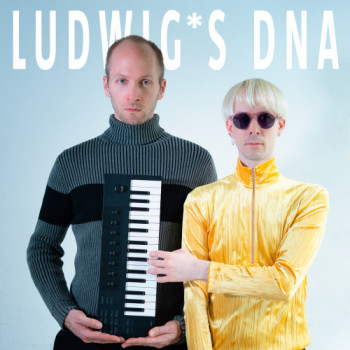On September 27, cellist and improviser Jan-Filip Ťupa and pianist-video artist Coco Schwarz debuted their collaborative album, Ludwig’s DNA. This record features 13 tracks that reimagine Beethoven’s cello sonatas alongside original compositions, blending the intimacy of chamber music with modern production sensibilities and experimental soundscapes.
Revisiting Beethoven’s Legacy
The album opens with Cello Sonata No. 1 in F Major, Op. 5 No. 1: I. Adagio sostenuto. While faithful to Beethoven’s original writing, the recording is notable for its contemporary production approach. With close microphone placement inspired by pop recording techniques, the cello and piano sound immediate and vivid, capturing even the smallest nuances. The result is an intimate and hauntingly beautiful interpretation that bridges classical elegance with modern accessibility.
The same approach is evident in Cello Sonata No. 3 in A Major, Op. 69: I. Allegro ma non tanto. Here, Ťupa and Schwarz maintain the integrity of Beethoven’s original composition, emphasizing the flowing lyricism and motivic interplay. The track’s clarity and balance are striking, drawing the listener into the intricacies of Beethoven’s writing without distraction.
Experimental Explorations
In contrast, Sirtuin 1 and Granulin showcase the duo’s experimental side. Sirtuin 1 begins with shimmering tones, almost crystalline, that evolve into a raw, powerful build-up. These original tracks introduce an avant-garde sensibility, with textures that contrast the acoustic richness of the sonatas.
Cello Sonata No. 4 in C Major, Op. 102, No. 1: II. Adagio – Allegro vivace offers a more restrained interpretation. This sonata is characterized by its lyrical beauty and a seamless transition between its contemplative opening and lively second section. In this rendition, the performers bring precision and depth to the shifting moods without electronic intervention, focusing on dynamic interplay between instruments.
Reinventing the Familiar
The final track, Cello Sonata No. 4 in C Major, Op. 102, No. 1: I. Andante (arranged for cello and Fender Rhodes piano), is a standout. Replacing the traditional piano with a Fender Rhodes introduces a subtle, modern warmth. The Rhodes’ distinctive timbre, paired with Ťupa’s resonant cello playing, offers a fresh yet understated perspective on this Andante movement. The result is a contemplative and serene conclusion to the album, demonstrating that even subtle changes in instrumentation can breathe new life into familiar compositions.
A Testament to Artistic Vision
Ludwig’s DNA is a bold yet thoughtful project, balancing reverence for Beethoven’s works with an adventurous approach to sound and production. By using close recording techniques, unconventional instrumentation, and electronic experimentation, Ťupa and Schwarz present a compelling case for the continued relevance and adaptability of classical music in the 21st century.
This album invites classical enthusiasts and experimental music fans alike to explore its nuanced textures and inventive reinterpretations, offering a glimpse into how tradition and innovation can harmoniously coexist.
Stream the “Ludwig*s Dna” on Spotify
Follow Jan-Filip Ťupa on here and their socials; Instagram, YouTube
